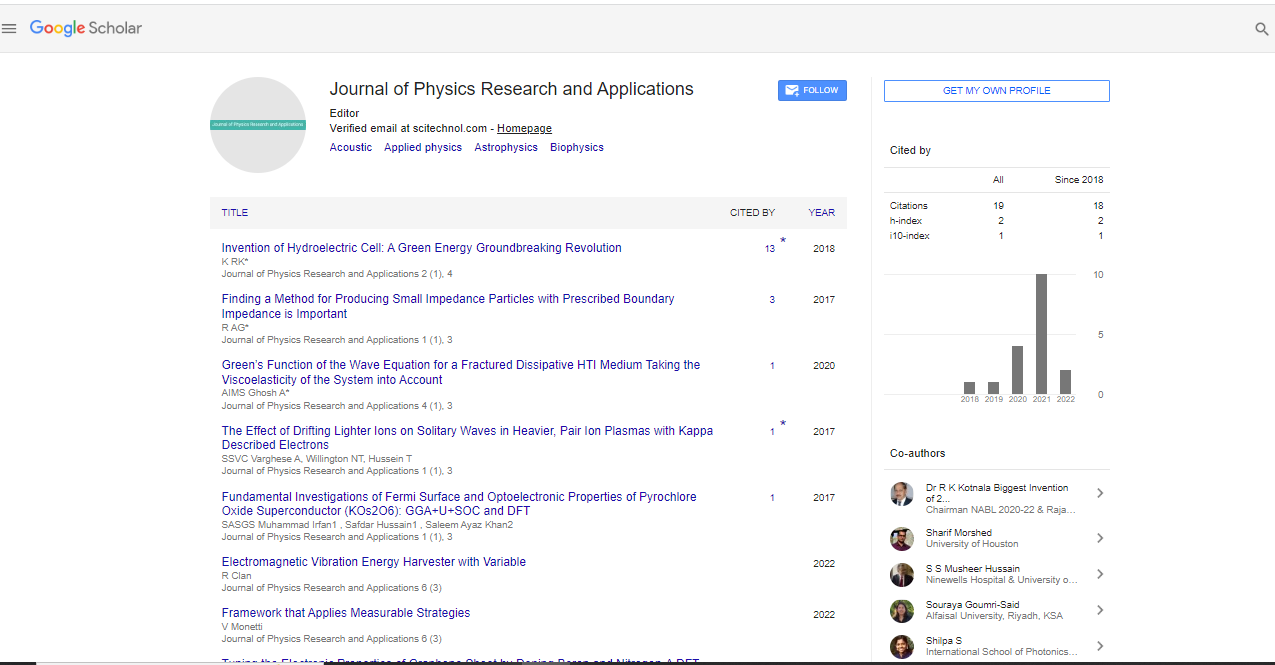Commentary, J Phys Res Appl Vol: 8 Issue: 1
Exploring Universality, Critical Exponents, and Scaling Theory in Condensed Matter Systems
Zheng Zhou*
1Department of Physics, Jiaotong University, Xian, China
*Corresponding Author: Zheng Zhou,
Department of Physics, Jiaotong
University, Xian, China
E-mail: 124768zh@zn.cn
Received date: 21 February, 2024, Manuscript No. JPRA-24-130824;
Editor assigned date: 23 February, 2024, PreQC No. JPRA-24-130824 (PQ);
Reviewed date: 08 March, 2024, QC No. JPRA-24-130824;
Revised date: 15 March, 2024, Manuscript No. JPRA-24-130824 (R);
Published date: 22 March, 2024 DOI: 10.4172/JPRA.1000097.
Citation: Zhou Z (2024) Exploring Universality, Critical Exponents, and Scaling Theory in Condensed Matter Systems. J Phys Res Appl 8:1.
Description
Condensed matter physics encompasses a diverse array of materials and phenomena, from the behavior of electrons in solids to the emergence of complex phases and properties in materials. One of the central concepts in this field is the study of phase transitions and critical phenomena, which underpin the understanding of universality, critical exponents, and scaling theory. Universality refers to the remarkable similarity observed in the behavior of different physical systems near their phase transition points, regardless of their microscopic details. This striking feature allows physicists to categorize phase transitions into different universality classes based on their shared characteristics, rather than focusing on the specific properties of individual materials. For example, the Ising model, which describes the behavior of magnetic spins on a lattice, exhibits the same critical behavior as certain liquid-gas phase transitions and the onset of superconductivity in certain materials. Despite the differences in their microscopic constituents, these systems all exhibit the same critical phenomena near their respective phase transition points.
The concept of universality enables physicists to develop general theories and predictive models that apply across a wide range of condensed matter systems, providing valuable insights into the fundamental principles governing phase transitions and critical phenomena. Critical exponents are mathematical quantities that describe how physical properties of a material change near its critical point, where a phase transition occurs. These exponents characterize the behavior of various observables, such as correlation length, susceptibility, and specific heat, as the system approaches its critical temperature. Critical exponents are classified into different universality classes, with each class characterized by a unique set of exponents. For example, in the Ising model, critical exponents describe how the magnetization, correlation length, and susceptibility diverge as the system approaches its critical temperature. The values of critical exponents provide information about the nature of phase transitions and the underlying symmetries of the system. For instance, the Ising model exhibits different critical exponents in dimensions above and below the upper critical dimension, reflecting the influence of dimensionality on critical behavior.
Scaling theory is a powerful framework used to describe the behavior of condensed matter systems near critical points. It posits that near a critical point, physical observables exhibit scaling behavior, where they depend only on a few universal variables, such as temperature, distance from the critical point, and the system size. According to scaling theory, the behavior of a system near its critical point can be described by scaling laws, which relate different observables to each other through scaling functions. These scaling functions encapsulate the critical exponents and govern how observables diverge as the critical point is approached. One of the key predictions of scaling theory is the existence of scaling relations, which express the interdependence of exponents and provide valuable constraints on theoretical models of phase transitions. These scaling relations have been verified experimentally in numerous condensed matter systems, corroborating the validity of scaling theory.
By recognizing the similarities in the behavior of diverse physical systems near their critical points, physicists have developed powerful theoretical frameworks that enable the prediction and interpretation of experimental results. The study of universality, critical exponents, and scaling theory not only sheds light on the universal principles governing phase transitions but also provides valuable insights into the underlying symmetries and correlations in condensed matter systems. As research in condensed matter physics continues to advance, these concepts will remain indispensable tools for unraveling the mysteries of the quantum world.
 Spanish
Spanish  Chinese
Chinese  Russian
Russian  German
German  French
French  Japanese
Japanese  Portuguese
Portuguese  Hindi
Hindi 
